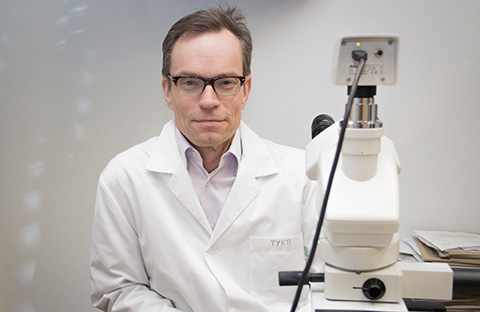Olli Carpén Becomes the First Biobank Professor in the Nordic Countries
The professorship funded by the City of Turku and the new Biobank Act make Auria Biobank a significant player and developer in the field of public health. – The biobank brings new prospects to patient care, research and product development, says Professor Olli Carpén.

Professor Olli Carpén
The professorship of biobank research together with the Biobank Act that came into effect at the beginning of September opens up research possibilities that are unique on a worldwide scale. Only a few countries offer similar opportunities for biobank research as Finland: population-based high-quality healthcare, diagnostic sample collections dating back decades, extensive collections of case histories and registers, and the population’s interest and positive attitude towards medical research.
–By utilising these possibilities, Finland can become the forerunner in biobank research, says Olli Carpén, who became the Professor of Auria Biobank at the beginning of September.
Carpén has been part of the Auria Biobank since it was established by the University of Turku and three Western Finland hospital districts. He also played an essential part in devising and starting up the biobank’s operations. Before Carpén, there has only been one biobank professor in the world, in Ireland.
–Carpén has extensive experience in research as well as clinical competence. As the biobank is starting its operations, it is vital that its key person has strong medical and occupational experience and brings national and international visibility and credibility to the position, says Kalervo Väänänen, the Rector of the University of Turku.
The City of Turku has contributed 200 000 euro for the professorship of biobank research for years 2013–2015.
–Competence in the different fields of bio research is the strength of the Turku area. For a long time, the City of Turku has strived to create conditions that promote the success and growth of this competence. By contributing to the biobank professorship, we are ensuring our position as forerunners. The well-being of the Turku area is based on continuous renewal, development and implementation of innovations and creating opportunities for entrepreneurship, describes Aleksi Randell, the Mayor of Turku.
The Biobank Develops Medicine for Individual Patients
Medical research has revealed a great amount of new information about the causes of different diseases and created new targeted drugs. Treatment options are becoming more diverse, but, at the same time, treatments are becoming more challenging.
– How to identify the best treatment for each individual patient and at the same time ensure that the cost does not jump through the roof? With hospital biobanks, such as Auria Biobank, we can hopefully find answers to these questions. In addition, biobank research increases the strong research competence in the area and improves the operational preconditions of bio companies, outlines Carpén.
Samples are collected into the biobank during treatments and diagnostics. The donors do not have to undergo any extra procedures and the samples are collected only by the donor’s consent.
–Consenting to give a tissue sample is a voluntary act to support the development of public health, stresses Carpén.
The Extensive Sample Reserve Is a Strength
The Biobank Act that came into effect in September allows the biobank to contact the donor if new research results have a positive effect on the donor’s disease.
–However, it is more likely that, after a few decades, the benefits of the biobank research will manifest as better diagnostic procedures and more effective treatments, says Carpén.
There are a few biobanks in the world, mainly in the Nordic countries, but what makes Finland special is that the biobank operations are founded on the public healthcare system. The basis of the biobank is the diagnostic and research samples gathered by healthcare professionals over several decades. With the new Biobank Act, these samples can be transferred to the biobanks’s resources with the donors’ consent.
Olli Carpén qualified as a doctor in 1982 and as a specialist in pathology in 1992. Since 2004, he has been the professor of pathology at the University of Turku as well as the Head of the Laboratory of Pathology at the Turku University Hospital. In addition, Carpén has extensive international experience: among other things, he spent years as a researcher at Harvard Medical School in Boston.
In his research, Carpén has especially focused on the causes of cancer and muscle disease as well as on the defence of the immune system against cancer. Recently, his group of researchers has studied which factors affect the prognosis of ovarian and colorectal cancer and developed methods that measure the effectiveness of treatment.
Text: Tuomas Koivula
Translation: Mari Ratia
Photo: Hannu Aaltonen